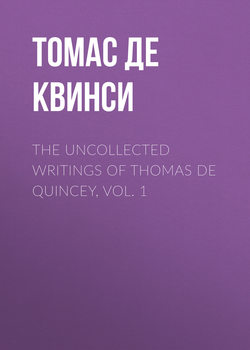The Uncollected Writings of Thomas de Quincey, Vol. 1

Реклама. ООО «ЛитРес», ИНН: 7719571260.
Оглавление
Томас Де Квинси. The Uncollected Writings of Thomas de Quincey, Vol. 1
PREFACE
A BRIEF APPRAISAL OF THE GREEK LITERATURE IN ITS FOREMOST PRETENSIONS:
No. I
No. II.—THE GREEK ORATORS
THE GERMAN LANGUAGE, AND PHILOSOPHY OF KANT
MORAL EFFECTS OF REVOLUTIONS
PREFIGURATIONS OF REMOTE EVENTS. 24
MEASURE OF VALUE.25
LETTER IN REPLY TO HAZLITT CONCERNING THE MALTHUSIAN DOCTRINE OF POPULATION
THE SERVICES OF MR. RICARDO TO THE SCIENCE OF POLITICAL ECONOMY, BRIEFLY AND PLAINLY STATED.31
EDUCATION
PLANS FOR THE INSTRUCTION OF BOYS IN LARGE NUMBERS.33
CASE OF APPEAL
ABSTRACT OF SWEDENBORGIANISM: By IMMANUEL KANT
SKETCH OF PROFESSOR WILSON.43
THE LAKE DIALECT
STORMS IN ENGLISH HISTORY: A GLANCE AT THE REIGN OF HENRY VIII.53
THE ENGLISH IN INDIA
I. HURRIED NOTICES OF INDIAN AFFAIRS
II. PASSING NOTICES OF INDIAN AFFAIRS
EUROPEANS
DELHI
III. SUGGESTIONS UPON THE SECRET OF THE MUTINY
ON NOVELS
DE QUINCEY'S PORTRAIT
Отрывок из книги
No question has been coming up at intervals for reconsideration more frequently than that which respects the comparative pretensions of Pagan (viz. Greek and Roman) Literature on the one side, and Modern (that is, the Literature of Christendom) on the other. Being brought uniformly before unjust tribunals—that is, tribunals corrupted and bribed by their own vanity—it is not wonderful that this great question should have been stifled and overlaid with peremptory decrees, dogmatically cutting the knot rather than skilfully untying it, as often as it has been moved afresh, and put upon the roll for a re-hearing. It is no mystery to those who are in the secret, and who can lay A and B together, why it should have happened that the most interesting of all literary questions, and the most comprehensive (for it includes most others, and some special to itself), has, in the first place, never been pleaded in a style of dignity, of philosophic precision, of feeling, or of research, proportioned to its own merits, and to the numerous 'issues' (forensically speaking) depending upon it; nor, in the second place, has ever received such an adjudication as was satisfactory even at the moment. For, be it remembered, after all, that any provisional adjudication—one growing out of the fashion or taste of a single era—could not, at any rate, be binding for a different era. A judgment which met the approbation of Spenser could hardly have satisfied Dryden; nor another which satisfied Pope, have been recognised as authentic by us of the year 1838. It is the normal or exemplary condition of the human mind, its ideal condition, not its abnormal condition, as seen in the transitory modes and fashions of its taste or its opinions, which only
or give even a colourable permanence to any decision in a matter so large, so perplexed, so profound, as this great pending suit between antiquity and ourselves—between the junior men of this earth and ourselves, the seniors, as Lord Bacon reasonably calls us. Appeals will be brought ad infinitum—we ourselves shall bring appeals, to set aside any judgment that may be given, until something more is consulted than individual taste; better evidence brought forward than the result of individual reading; something higher laid down as the grounds of judgment, as the very principles of the jurisprudence which controls the court, than those vague responsa prudentum, countersigned by the great name, perhaps, of Aristotle, but still too often mere products of local convenience, of inexperience, of experience too limited and exclusively Grecian, or of absolute caprice—rules, in short, which are themselves not less truly sub judice and liable to appeal than that very appeal cause to which they are applied as decisive.
.....
Next comes the drama. But this is too weighty a theme to be discussed slightly; and the more so because here only we willingly concede a strong motive for learning Greek; here, only, we hold the want of a ready introduction to be a serious misfortune. Our general argument, therefore, which had for its drift to depreciate Greek, dispenses, in this case, with our saying anything; since every word we could say would be hostile to our own purpose. However, we shall, even upon this field of the Greek literature, deliver one oracular sentence, tending neither to praise nor dispraise it, but simply to state its relations to the modern, or, at least, the English drama. In the ancient drama, to represent it justly, the unlearned reader must imagine grand situations, impressive groups; in the modern tumultuous movement, a grand stream of action. In the Greek drama, he must conceive the presiding power to be Death; in the English, Life. What Death?—What Life? That sort of death or of life locked up and frozen into everlasting slumber, which we see in sculpture; that sort of life, of tumult, of agitation, of tendency to something beyond, which we see in painting. The picturesque, in short, domineers over English tragedy; the sculpturesque, or the statuesque, over the Grecian.
The moralists, such as Theogins, the miscellaneous or didactic poets, such as Hesiod, are all alike below any notice in a sketch like this. The Epigrammatists, or writers of monumental inscriptions, &c., remain; and they, next after the dramatic poets, present the most interesting field by far in the Greek literature; but these are too various to be treated otherwise than viritim and in detail.
.....